Andrew Wells: 1973-2006

Published in The Atlanta Journal-Constitution on 11/4/2006.
Andrew Wells was a frequent contributor to This Lamp and my very good friend.
Updates for Reformation Day, 2006
As an Amazon.com Associate, I made $33.49 in referrals last quarter. My thanks go to all of you who made purchases through my online store or through one of the links on my blog. Amazon has reserved a gift certificate for me in the above amount which I will save for specific use toward my degree. Inevitably I regularly come across this or that book that is difficult to find, but I often can get it through the used book sellers on Amazon. So thanks again to all of you.
A few weeks back I wrote about a former student of mine, Josh Clark, who had worked up a scheme to get his own Mac by asking folks to donate $1 through PayPal. Although he raised about $67 this way, the funds eventually stopped coming in. Then he found another scheme that just happened to work. He researched the companies that offer free computers once you sign up for so many offers. He followed one of them through to the end and now he actually has a MacBook Pro which after all was said and done cost him about $30! Read his story at "How I Got a Mac for Next to Nothing."
Finally, the next installment on my favorite Bible translations (#8, the GNT) was halfway finished at the end of last week, but I'm neck-high grading papers for both IWU and SBTS and have had to make those a priority over everything else. Hopefully, I'll have that posted by the end of this week, so stay tuned.
And Happy Reformation Day!
The Andrew Wells Report

Continue to pray for Andrew, and you can keep up to date at http://andrewwellsreport.blogspot.com/. Any encouraging comments for Andrew and Leila on their blog would certainly be appreciated by them.
Pray for Andrew Wells
Andrew's condition is very serious and he needs your prayers. When I talked with his wife Leila Tuesday, she said that they were trying to sedate him because his body seemed to be fighting the respirator--trying to breathe over it. I asked Leila if he was awake. She said that when she went in to see him his eyes never opened so she doesn't even know if he was aware of his surroundings. This is a result of graft vs. host disease in his lungs and he may have a touch of pneumonia on top of that.
As of this morning Andrew was calm due to meds to sedate him. His heart rate is still very high and his blood pressure is fluctuating sometimes fairly low. Apparently the heart and bp issues are somewhat normal for what he is going through. One scan found nodules on his lungs which are likely pneumonia but further tests today will confirm if it is that or something other. He is on antibiotics for the possible pneumonia.
Leila and Andrew's mom stayed at the hospital overnight. She said she was able to get some sleep--she actually sounded a little better this morning.
A little while ago, I received this email from Leila:
"Rick, Just to let you know that we have some tentative good news. Andrew's fever has dropped by a degree (from 102 to 101) and they have gotten him off of one of three blood pressure medicines. This is good news. (It was bad that they had him on three.) I'll send out a larger update later once we have spoken to the doctors. The prayers are working. Keep 'em coming!"
I will post updates as I know more. If you are a praying person, please pray for Andrew.
UPDATE 10/12, 10 a.m.: Leila sent an email this morning with good news:
I have some wonderful news to share this morning. (I would have put it on the blog, but the Blogger server is not accessible at the moment.) Through the night, Andrew began to respond to the medicines. His heart rate is now down to about 120 beats per minute, which is the best it has been in a very long time (even before all of this started). His blood pressure is holding steady and they have taken him off of ALL of the blood pressure medicines! His fever is gone. His oxygen level is holding at 99% and they have scaled back the level of O2 they are giving him. Finally, they have identified the bacteria that brought on the sepsis: it is a garden-variety strep that caused his pneumonia, not the strange fungus or unidentifiable bacteria they originally suspected! We're not out of the woods. He's still on a vent, he's still on heavy antibiotics that bring increased risk of bleeding, he's still heavily sedated. We've got a long way to go, but we're pulling out.
Prayer works!!!!!!! Please keep praying and praising God this morning, because the lung doctor who is second in command here at Emory gave Andrew very little chance of pulling through the night yesterday. Given that he has/had sepsis, is severely immuno-compromised, and has pneumonia, I can't say that we had much confidence yesterday either, except in our God!
I'll update the blog as soon as I can get on the server. Thank you, everyone, for your fervent prayers. Please spread the word for us.
American Movie Classics: The Official "Wellsian" Rant
Because I’m recovering from my latest hospital visit, because Rick is so nice to share his blog, because I’m stuck in a chair, because I’m pumped full of steroids, because I’m on a quixotic quest, because I love all of you, you get three mini-movie rants for the price of one. Thank you for putting up with my insanity; enjoy the freakshow.
Rant 1: Turner Classic Movies is king. But American Movie Classics (AMC) used to be a strong runner up. Then they decided to go “hip” by adding commercials and picking really lousy movies. AMC has a “movie of the month.” Perhaps because of the recent issues involving privacy and wiretapping, their current selection is Enemy of the State. Basic plot: Will Smith unknowingly receives evidence that will indict a high-level government official. In order to get it back, the government turns his life to dust.
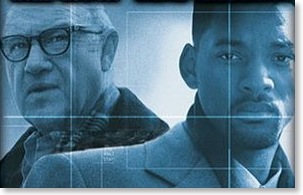
The ridiculous icing on the cake is who helps Will Smith. It’s Gene Hackman, and he must have been desperate for the money, because he’s already made the definitive movie about privacy and secrecy, The Conversation.
The Conversation is Francis Ford Coppola’s forgotten fourth masterpiece (after Godfather One and Two and Apocalypse Now). Hackman plays Harry Caul, the best wiretapping expert in the business (back when wiretapping was using reel-to-reel). Caul moves to the West Coast because his work back east may have led to a murder. He’s anti-social but desperately in need of human connection, reclusive and racked with guilt. Hackman absolutely nails Caul, and the character type has become critical to the movies. There’s genuine fear and menace from outside forces here, as Caul discovers that no matter how much he tries to insulate his life, he’s powerless. It’s the true message we need to get out of the current debate, not a nifty gizmo movie like Enemy of the State.
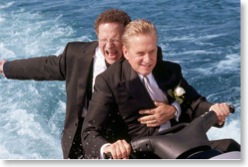
Rant 3: The one thing AMC is doing right is its DVD enhanced movie edition, which is actually kind of cool. You’d think otherwise, but other than having a good picture and sound, I’m not a big fan of DVD extras and releases, especially commentaries. They are hit and miss, and I don’t like people talking over a movie [Rick's note: This is true. Andrew is no fun at the movies because he yells at you if you make any comments--even during the trailers]. AMC solves that problem by using letterbox and providing lots of facts and details printed underneath, so you can read and watch. They had an excellent one on the first James Bond movie Dr. No and (of all things) the first Rambo movie (First Blood) a few months ago. The current one is Butch Cassidy and The Sundance Kid (BCSK).
There’s been talk of a remake—with Matt Damon and Ben Affleck, for crying out loud—and that’s about as ridiculous as they come, because BCSK is one of the most unique and timeless movies ever made. However, I’m convinced that the characters have become so iconic that people have forgotten the movie.
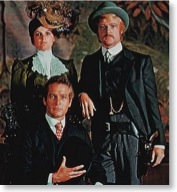
The timeless movies are the ones that give you new things to think about long after you’ve seen them, and that’s what makes BCSK great. The movie plays very differently to me now, especially after 9/11 (never thought I’d say that). The pathos and fatalism of the characters and the story come to the surface early. These characters may have fun--especially Newman--but their world is changing and they can’t hide from that, and every time they face it, the movie grows darker. It feels far more representative of our reality now then it must have in 1969.
To even try to remake this seems ridiculous. Redford is pure star power here, and this, along with Cool Hand Luke, is the definitive image of Newman. Their chemistry is unmatchable. They re-teamed for The Sting, but that movie is much more about plot; the characters are what matter here. Newman has announced that he’s probably going to do one more movie before retiring, and he wants to do it with Redford, but they’ve had a frustrating twenty years trying to find a good script. Having them together would be a lovely way to go out. Here’s hoping AMC doesn’t chop that movie up.
Andrew Wells can be reached at arwell012002@yahoo.com.
Infernal Affairs

I first heard about The Departed around two years ago. It's a remake of a Hong Kong film called Infernal Affairs. Intrigued, I laid aside my usual trepidations and checked out the original, and was rather surprised that I "got" it, perhaps because rather than assuming the audience will understand its mindset, the movie takes the time to lay out the characters and motivations.
Eager to break up a notorious Hong Kong gang, two police officials work for years to place a cop mole in deep undercover. They are the only ones that know about their mole. The gang boss, wanting to beat the police, works for years to get a gang mole into the police department. He's the only one who knows about his mole. Eventually, each leader figures out they have a mole. Guess who each leader sends to sniff out the other mole?
It's a brilliant setup. When everything in your life is a lie, do you become a lie too? Can you stay true to yourself when you've been someone else for so long? Each mole has to deal with these issues, in addition to solving their problems, working for their bosses and covering their tracks. The cop mole's issues are played out with a little more weight--especially toward the end--but the gang mole's issues aren't sold short either. One of the most interesting things, in fact, is the conflict that he has about his lifestyle.
The film has some riveting set pieces. There's a drug raid standoff where you just can't figure out how the moles are informing their bosses, and the answers turn out to be ingenious. A confrontation in the police station where everyone suddenly figures out what is going on is played for maximum drama. The movie makes credible moves to raise the stakes, but also supplies emotional resonance to the characters--something you don't always see in Asian cinema.
Eventually though, the movie just can't go anywhere else. Something will have to give. The movie tries to cushion that fall, but it's still a rough landing. The film further suffers from the traditional Asian postscript, where things are told rather then shown. But for three-fourths of it's time, Infernal Affairs is remarkably good, and I give it a high recommendation. As to The Departed, Scorcese has always had an interest in this type of material, and he's one of the few people I believe could improve on the original. So there's a lot to be hopeful for.
Andrew Wells can be reached at arwell012002@yahoo.com.
Retro Review: The Wicker Man (1973--the original version)
A Guest Retrospective by Andrew Wells
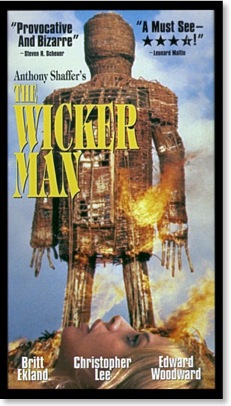
Here's the scenario of the original movie: A call goes out to a police district headquarters in rural England. A little girl has gone missing from a small village on a remote isle. Sergeant Howie (Edward Woodward) travels by seaplane to investigate the disappearance. Although he comes off as a bit rigid in the portrayal, the movie goes to great length for the viewer to understand that Howie is a devout, practicing Christian (most likely Catholic) who draws strength from his faith. He is scheduled to be married in a week, but feels compelled by duty to go out to investigate the girl's disappearance.
The island's main employer and ruler is Lord Summerisle (Christopher Lee, who has claimed this as his favorite role). In order to increase production and keep the workers happy, the rulers decided to long ago give up practicing Christianity and instead pursue paganism.
This is where The Wicker Man really gets macabre, because this is not your average Hollywood paganism (like witchcraft). The movie takes considerable time to explore a society that has evolved without Christian teaching. What would people act like? What would their morals be? How would their values appear in their surroundings? The movie comes up with some distrurbing ideas. The image I find hardest to shake is a group of children celebrating recess by dancing around a maypole and chanting hymns to an earth goddess like they were nursery rhymes.
Howie not only now has to find the missing girl, but he must do so in surroundings that are completely different to his beliefs. This leads to all sorts of temptations for Howie, much of it sexual. And this is where I want to be absolutely clear to the reader: Even though everything is given a proper context, and is by no means gratuitous, there is a fair amount of nudity in this movie, especially when Howie first arrives in the village. Sensitive viewers may want to skip the scene of Howie's night at the inn altogether. After that, the movie settles down somewhat, though the discussion is still frank.
Yet the movie remains, quite amazingly, fair-balanced in discussing Christianity and paganism. Though he has temptations, Howie proves to be quite strong and formidable in his faith. The scenes where he calls on God for strength are genuine moments. His alarm at the situation he is in does not keep him from doing his work or standing up for God. The pagan village, though shown to be peaceful and kind, is not glamorized as uninhibited and free-spirited. Quite the opposite, actually. Strenghts and weaknesses of both systems are pointed out and examined.
Why would anyone even TRY a remake? It is impossible to discuss this movie's ideas in the current culture. Religious belief of any kind is a powderkeg in the media right now. And to make a movie that rationally examines these issues, instead of pushing emotional buttons and taking shortcuts? Is that even possible? Would people be willing to take the time to listen? Would dialogue open up? Sadly, I doubt it.
So it makes sense that the new Wicker Man would most likely be a straight-on horror remake. But the new movie won't be able to get that right either. The original ending is one of the all-time movie shockers, but what makes it shocking is not what happens, but why it happens--and that's all tied in to the issues the movie raises.
Because of the aforementioned nudity and that shocking finale, I'm not going to endorse this movie. But if you are looking for a movie that will make you think, The Wicker Man is a good one. If nothing else, you'll wish you could find out what happens in the village next spring.
Andrew Wells may be contacted at arwell012002@yahoo.com.
For further investigation:
- The Wicker Man (1973): IMDB Page
- The Wicker Man (2006): IMDB Page
- From Wikipedia: The Wicker Man 1973 movie entry and "Wicker Man" general entry
Somebody Get an Anvil!
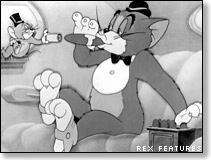
I understand that there is a need to explain our culture and our heritage to children, and to make sure they understand it in the proper context. That includes cartoons. Cartoon Network did a special a couple of years ago that looked at Japanese racism in World War II cartoons, including racist slang and mentioning interment camps.
But come on…smoking? Tom and Jerry hit each other with frying pans, shovels, etc., set each other on fire, blow each other up, shoot at each other. They practice just about every form of cartoon violence possible. And this company is going to edit out smoking? Shouldn’t they be worried that children will be imitating some of Tom and Jerry’s other inappropriate behavior?
Furthermore, kids see smoking just about everywhere. Hollywood had a contract (written or unwritten) with the tobacco industry for years to show characters using cigarettes. Court documents have revealed that Joe Camel was especially created to get the youth market, and that tobacco advertising has been aimed toward children for years. Cutting it out of a cartoon, good intentions or not, is like putting a band-aid on a trauma wound.
But that’s not what really makes me mad. No, what is insane about this is that the company received a complaint from only ONE person. Not a group, not a bunch of people, just one person. A company caved in to one complaint.

I wish Chuck Jones and Tex Avery were still alive. They directed some of the best Tom and Jerry cartoons, and I bet they would have something wickedly funny to say about this. As it is, I hope their ghosts find all the people involved in this and drop anvils on their heads. But not before giving them a blindfold and one last puff of a cigarette (and I just know that some of you are going to criticize me for that comment).
Andrew Wells can be reached at arwell012002@yahoo.com.
Living Life on THE WIRE
And do not be conformed to this world, but be transformed by the renewing of your mind
--Romans 12:2, NASB
It's easier to pull the trigger than play the guitar. Easier to destroy than create.
--El Mariachi (Antonio Banderas) in Desperado
We ain’t never gonna change / We ain’t doin’ nothin’ wrong / We ain’t never gonna change / So shut your mouth and play along.
--"Never Gonna Change" by The Drive-By Truckers, on The Dirty South
The following is something I've wanted to talk about for a while, but had difficulty approaching. I thought about a multi-part series, I thought about a rant, but nothing seemed to work. And then I found out The Wire was starting its fourth season on HBO, and the third season is out now on DVD. And I had my opening.
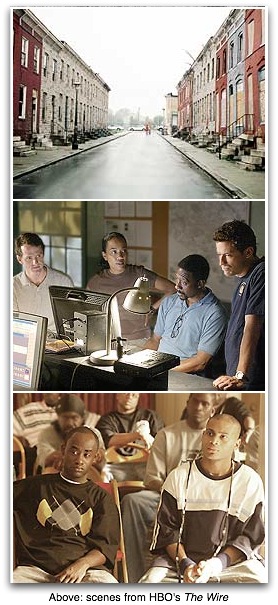
And oh yeah: it's filthy. Maybe not Deadwood or Sopranos filthy (I’ve never had HBO; I've watched all of 15 minutes of Sopranos in a hotel room, so I don’t have a good comparison), but filthy enough that I couldn’t in good conscience watch the rest of the first season, and I haven’t even tried to crack open seasons two and three.
To be sure, and I'm not boasting about this; I’ve seen plenty of movies and television, read plenty of books, and listened to a lot of music with violence, language, sexuality and so on. And our society tends to group things poorly: the movie Almost Famous is a pretty tame R-rated movie compared to Kill Bill; Stephen King will never be mistaken for F. Scott Fitzgerald.
But that’s not my problem. No, my problem is that The Wire is a great artistically satisfying work, yet it also appalls me. And it sums up my issue: can artistic interests and Christianity exist at all?
I sort of touched on this problem in my piece concerning the current state of Christian music. I said more or less that the music industry doesn’t really do a good job of allowing Christian artists to explore musical (and even lyrical) avenues. But I think the problem can be seen all over the place. We have Frank Peretti, but where’s a Christian James Joyce? We have Thomas Kincaid, but where’s a Christian Picasso? We have the Left Behind series, but where’s a Christian Martin Scorcese?
No, those names were not picked randomly. Each one pushed boundaries in some way. They’ve explored life, religion, values, and many other related issues. And I don’t see the current mainstream Christian culture developing in this area. Yes, I know there are many "fringe" and "alternative" Christian artists of all genres, but there are a great many people unaware or unable to locate them, and that is who I’m thinking of. I know there are creative energies in the Christian community, but it could be so much more.
The flipside of the problem is that it seems all the creativity in the secular culture seems to be encased in material designed to be as shocking and/or perverse as possible. Granted, The Wire is a very real, tragic and involving story, but do we need to hear a four-letter word in every sentence? More importantly, is it wise to expose ourselves to this kind of secularism, no matter how much it appeals to us aesthetically? Can I listen to the Drive-By Truckers, a very good Southern rock band that write unbelievably intelligent and beautiful songs, but write about murder, drugs, drink, failed marriages and the like, because I can’t find anything remotely as satisfying in the Christian arena? Is it easier to be fulfilled by what ultimately will destroy you than by what will uplift you? And how does all this affect our relationship with Christ, our testimony, our lives?
I’m sure some people have simple answers--"Just walk away from temptation" and "Fill up on the Word of God" and so on. While those are good answers, I find they are not satisfying ones, because how we handle the world--and how we handle the aesthetic capacity God has given us--is a complex question.
What do you think?
Andrew Wells can be reached at arwell012002@yahoo.com.
The Impossible Super X-Pirate Vice Code in the Water
Final thoughts on the movie summer (yes, I know it’s August, but in Hollywood, it’s over).

Best movie about Jesus Christ that didn’t mention Jesus Christ: Superman Returns. How messianic can you get?
Worst movie about Jesus Christ that did mention Jesus Christ: The DaVinci Code.
More things for Christians to worry about: While Code had much hoopla and made (relatively) little money in America, the movie has quietly racked up nearly $750 million dollars in other parts of the world.
Best way to kill Superman besides Kryptonite: Send Johnny Depp after him.
Second best way to kill Superman besides Kryptonite: Release an awesome trailer for the big movie event of next summer the day before your competition comes out, so that everybody will talk about you and not them.
Who’s laughing now: Everybody thought Fox Studios was being petty in racing to get X3 out because director Bryan Singer jumped ship to make Superman Returns. Yet they’ve made more money so far.
Can’t Get a Break Award: To Orlando Bloom, who will wind up starring in two of the most highly successful movie trilogies of all time, yet will probably never work again.
The book is probably better than the movie: Nobody seems to like M. Night Shyamalan’s Lady in the Water. What might be the final nail in the coffin is Michael Bamberger’s book The Man Who Heard Voices, which provides an account of how Shyamalan came up with the movie, how he broke up with Disney studios over it, and how he got it made. The book argues that Shyamalan may be the most distinct original voice since directors Alfred Hitchcock or Stanley Kubrick, but that he also may have the ego to match.
Lesson that Hollywood has finally learned: Despite the success of Miami Vice, movie makers seem to have realized that people don’t want to see movie adoptions of old TV shows anymore. At least till the next one comes out.
Lesson that Hollywood needs to learn: That special effects aren’t everything. It’s been 15 years since the true arrival of CGI in the movie Terminator 2: Judgment Day, and that movie still looks better than almost anything coming out now. Everybody is amazed at Pirates' Davy Jones character, but I’d rather have consistency than the latest breakthrough. And does any director under 30 know how to use effects to help tell a story, instead of using it as a crutch?
Last year’s junk is this year’s treasure: Ridley Scott’s Kingdom of Heaven was thoroughly trashed last year. But a director’s cut has come out this year, restoring over an hour of material. It supposedly makes all the difference in the world, turning a misunderstood movie into a great historical epic.
Christmas in July: We’ve got Spiderman 3, Pirates 3, The Bourne Ultimatum, Ocean’s 13, and a lot of other promising titles next summer. It’s the most excited I’ve been about movies in a long time.
Rick's Comment: C'mon, Andrew...I think I heard you say that same last sentence last summer.
Andrew Wells can be reached at arwell012002@yahoo.com.
Goodbye, Johnny
[RICK'S NOTE: At the risk of overly-commercializing Andrew's review of Johhny Cash's music, I thought it would be helpful to provide direction to those who would want to obtain the music discussed here. All text links will direct you to the iTunes Music Store and if you prefer physical CDs, obviously all graphical links go to Amazon.com.]
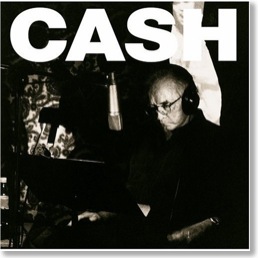
Even if it was a Nine Inch Nails cover, his last single "Hurt" from American IV: The Man Comes Around would have been a beautiful final statement. With all that he accomplished in life, all he had seen and done, "Every one I know goes away in the end." It is the loss of family and friends that mark his days. The music video is probably one of the most moving ever created, cutting back and forth between pictures of Johnny Cash in all the stages of his life and video of him as an old man among his memories. It would have been a perfect ending to Cash’s career.
Would have. Rick Rubin, Cash's producer, should have waited a lot longer to release American V: A Hundred Highways--or maybe not at all.
It's not that it is bad. Cash really seemed to relish stripping his style bare, and that comes through here. But none of the songs really have the punch of "Hurt," yet the whole album is an extension of that one song. Whether doing covers of originals, directly or indirectly, the theme of every song becomes death. Several seem to have been selected with his wife, June Carter Cash in mind (she passed away four months before he did). As a statement and as a historical document--Cash sings several traditional tunes--it has real value. As an album, though, it’s really hard to listen to.
Rubin states in the liner notes that eventually he will release a boxed set of Cash’s material called Unearthed. In the last months of his life, Cash was recording as much as he was physically able to, singing songs that had been passed down to him or had been well-known in his childhood. If Rubin had been wise, he would have added this last album to the set, instead of releasing it separately. American V doesn’t tarnish Cash’s career at all; it just doesn’t provide the closure like it should--like "Hurt" does.
After Elvis Presley, Johnny Cash's material seems to be on every recording label possible. There must be dozens of "greatest hits" CDs alone. The problem is that, as with Presley, you have to dig through a lot of Cash’s recordings to get to the real jewels, and his albums haven't all been reissued. Here are some recommendations if you are starting out, wanting to cover your bases or if you are just diving in:
For his earliest work, get The Sun Years which has all his important singles and several B-sides he made for Sun Records.
Cash jumped ship to Columbia Records (now Sony Music) when he couldn’t make the music he wanted. The absolute necessity from this time is Johnny Cash at Folsom Prison. It covers several different types, shows Cash at his best, and is arguably the greatest live album ever. Pick up the "American Milestones" edition if possible, because it has the complete (and unedited--be warned) concert. Johnny Cash at San Quentin is also supposed to be quite good, though not quite in the same category.
For Cash’s religious side, seek out Hymns by Johnny Cash, the "American Milestones" edition. Shortly after he died, Rubin released My Mother’s Hymnbook, a collection of hymns done in Cash’s later style. It hasn’t received near the attention that this last album has received—I’ve mostly seen it in Christian bookstores—but worth a listen.
From his American Recordings era, the essential is American Recordings. Just strumming a guitar, Cash takes a bunch of songs from wildly different writers (Nick Lowe, Henry Rollins and Leonard Cohen, to name a few) and somehow melds them into a cohesive, beautiful whole. His follow-up, Unchained, finds Cash going back to his rock and country roots, with great success. The third and fourth American albums, while well-produced, are hit-and miss.
Until we are able to hear Unearthed, the gold standard for "previously unreleased material" seems to be Personal File, a collection of songs Cash recorded in the 70s and early 80s but for unknown reasons never released. Again, it's just him and his guitar, but that was what Johnny Cash was all about.
Andrew Wells can be reached at arwell012002@yahoo.com.
The Pirates Strike Back
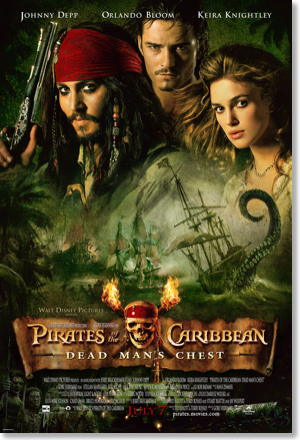
Lucas can say all he wants about envisioning six or nine movies in his saga, but he probably thought he’d never get past Star Wars. But when he did, Lucas felt like he had to make a more “serious” film, and a “darker” one. The article argues that much of his research for Apocalypse factored into the themes of The Empire Strikes Back: fathers and sons, finding your true nature, and so on.
Apparently the same approach is used in Pirates of the Caribbean: Dead Man’s Chest (hereafter referred to as Pirates, because it’s too long to keep typing). The first Pirates has its share of emotion (Barbosa’s soliloquy about his plight is saddening), but it is really just a popcorn movie with lots of action, scares and comedy.
Not this time around. We get some impressive action, including an exciting “Mexican standoff” version of a swordfight, some good scares and some comedy. But we also get serious themes about “What do you truly want?” and “Will you make the right choices at the right time?” It’s not quite sitting through a lecture, but after awhile it drags down the movie. And there is a lot of “dark”—physically and thematically.
Will and Elizabeth (Orlando Bloom and Keira Knightley) have their wedding day ruined when they are arrested by Cutler Beckett (Tom Hollander), a representative of the East India Trading Company, for helping Jack Sparrow (Johnny Depp) escape from the noose. Beckett offers Will a deal: find Jack Sparrow, bring back Jack’s “broken” compass to be set free. Having no choice, Will agrees. Eventually, Elizabeth sets out on to find Will. Meanwhile, Jack is doing everything he can to hide from Davy Jones (Bill Nighy), because Jack owes him a very serious debt. So everybody travels their own paths, just like in Empire. And everybody has to confront some darkness in others and themselves, like in Empire. And the movie ends on a sort-of cliffhanger, with a lot of loose ends, like in Empire. Think of Yoda as a voodoo priestess, and you’ve got the idea.
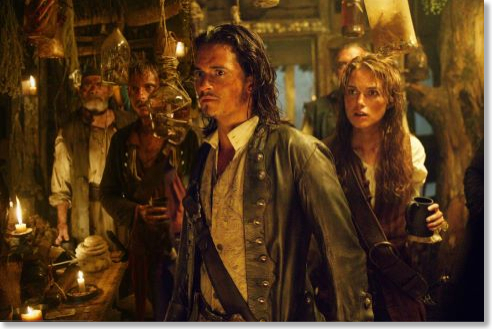
Remember what I said about dark? Believe it. This has got to be the darkest movie Disney has ever given its logo, and is definitely NOT for children in any way. There are some gruesome images (including a man having his eye plucked out, a beating heart, any sight of Davy Jones and his crew) that probably should have gotten the movie an R. There’s also a lot of sexual innuendo—far more than in the first movie. And, like Empire, the whole movie has an undercurrent of darkness that can get under your skin.
It takes a while to get the story going (they could have probably figured out how to tighten up the first 45 minutes), but it’s unstoppable after that. The action is first rate. The special effects set a new standard, even if they are a bit uneven. The effects people get bonus points for the kraken, though, which looks like what Ray Harryhausen would have done if he had been asked to design the sand pit monster from Return of the Jedi.
The acting is good too. Pirates brings back most of the supporting players, including some real surprises. Bill Nighy, as Jones, is very impressive, given that the look of his character is entirely computer-generated. Depp gives Jack everything he’s got, doing some great physical comedy (it’s fun just to watch Jack run away).
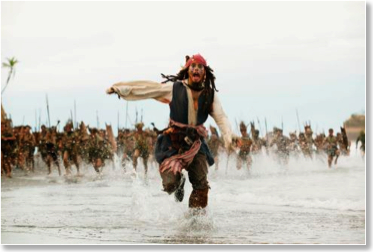
But the serious tones underlying the story began to tear at the Jack character, which eventually dampens the movie. Without giving plot away, the movie wants Jack to stay a comical scoundrel, but also redeem him. Think of the character development of Han Solo without the smirk. But the movie veers on this issue wildly. For all his funniness, Jack does some very selfish, despicable things in this movie. But when we see Jack act upon a possible redemption, we cheer because we love Jack, but his actions are so out of character, especially in the last twenty minutes or so, that the movie almost falls apart.
It will be interesting to see where the movie’s makers go with all this for the third movie (coming next summer). Storywise, they go out with a truly great setup. But a redeemed Han Solo was really not much fun in Return of the Jedi and I’m not sure a redeemed Jack in the third Pirates will be either.
Andrew Wells can be reached at arwell012002@yahoo.com.
Also of interest: Official Disney website for the Pirates trilogy
Superman: The Iconic Review

A great deal of this mythos, as Rick said in his review, has been shaped by the Superman movies--especially the first one. Superman: The Movie is flawed in different ways--some outdated special effects, inconsistencies in the plot, goofy humor, etc.—but director Richard Donner, composer John Williams and Christopher Reeve got the epic and joyful tone right; they knocked that one right out of the park. When Superman flies by us in that last scene, it’s as deeply felt a movie moment as any in history: the most powerful being on earth, and he slows down to stop and smile at us. It’s pure joy and bliss, epic and wonderful, and Donner let us relish that moment
For all the lavish and respectful devotion paid to everything Superman, Superman Returns just doesn’t get that. The opening credits and the final scene will tell you why.
Instead of letting us soar with Williams' theme and feel the vastness of space, director Bryan Singer fills the screen with images as we swoop by various wonders of the galaxy. The movie is too busy trying to keep us interested. The whole movie is like this, with few exceptions.
I’d like to say more, but I’m not sure I really need to. The final scene says it all.
In homage to the Superman movies, we see Superman (Brandon Routh) flying over the curve of the earth, right past us.
But he’s gone too quickly, and he doesn’t stop to smile.
Andrew Wells can be reached at arwell012002@yahoo.com
Ocean’s 12: L’Autopsie du Cinéma
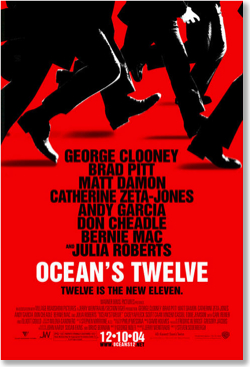
So I saw the Ocean's 12 sequel when it came out in theaters, and it was bad. I got to watch it on DVD a couple of nights ago, and only did so because I wanted to give the movie a fair shake. It’s still bad. What went wrong?
The plot: Benedict (Andy Garcia), the bad guy that Danny Ocean (George Clooney) and his crew stole money from in 11, is given information about who robbed him from a shadowy figure known as The Night Fox. Benedict demands his money back or else. Feeling they have no choice, Danny and the gang head to Europe to do a job to repay Benedict, but The Night Fox is a step ahead of them. Meanwhile, Rusty (Brad Pitt) must deal with an old flame turned police investigator (Catherine Zeta-Jones).
It seems like it takes forever to figure that out, because I’m guessing two-thirds of the time the movie gets in the way of itself. 12 commits three serious mistakes, in addition to a great many smaller ones.
First, the movie is too…French. Or European, if you want to be politically correct. Director Steven Soderberg has always made clear that foreign films and the avant-garde has an affect on his directing style. In his big studio productions, he’s usually been able to make effective use of these influences. Out of Sight, Traffic, and 11 and even Solaris are all good examples. In 12, however, the style just gets in the way. The oblique conversation with Danny, Rusty and Linus (Matt Damon) in the bar, the wacky comedy scene at the Paris train station, the attempt at farce when Tess (Julia Roberts) shows up to help in the heist—the style and format is all taken from French New Wave movies (such as The 400 Blows and Breathless). But no attempt has been made to work this material into the film; in fact, 12 comes off like a bunch of scenes strung together poorly, many of them improvised by the actors goofing around.
Improvisation, if there is any, may also be 12's second mistake. There were character moments in the first movie, but they were secondary to the plot. Here it is the other way around—the movie is less about plot than getting the characters together. There are long scenes where the characters just jabber, without getting anywhere, especially in the hotel. The characters, especially the supporting ones, aren’t built for the work, and neither are most of the actors playing them.
The third mistake involves the golden rule of con movies, which is show the audience the con. The idea is that the audience is supplied the information in the movie, but then something happens or is said that changes the meaning of everything that comes before it; thus, the con is revealed. In 11, this worked effectively. The audience knew the crew was pulling off an impossible robbery (i.e., the con), but did not realize the depth and cleverness of the con till the very end. Here, the audience doesn’t even get to see the real robbery, but also have to accept the improbable—that Danny and his crew knew the whole situation almost from the first moment, and were playing The Night Fox and Isabel the whole time. Special mention must be made of the improbable lasers (you’ll know it when you see it). Remember another movie golden rule: audiences will believe the impossible, but not the improbable.
The film has some good in it. The soundtrack is by retro-cool artist David Holmes, with lots of good percussion and horns. There are some excellent in-jokes regarding Hollywood and the first movie, including a hilarious cameo meltdown by Topher Grace. My favorite in-joke is what song Benedict is playing on the piano when he finds the Don Cheadle character. You have to watch the credits to discover it. Matt Damon comes off the best here--his character actually develops, and instead of goofing around, he’s trying to act. I can’t wait to see what he does with The Departed and The Bourne Ultimatum.
Amazingly, 12 made enough money that there will be an Ocean's 13 in 2007. Roberts and Zeta-Jones aren’t scheduled to star, but Al Pacino is involved, and supposedly the movie will take place in Las Vegas again. That’s probably a good idea, since 12’s visit to Europe was such a bust. Bon débarras!
Note: all mangling of French is the writer’s fault, since he doesn’t speak it.
Andrew Wells can be reached at arwell012002@yahoo.com.
Batman Returns: The Redemption
I spent a week recently at a beach house that had HBO, which showed Batman Begins one night. (I stand by my original review, although now I think the whole movie is over-edited, not just the action scenes.) The next day they showed the 1989 Batman, and that got me thinking about the whole series.
If Star Wars and Jaws were the beginning of the summer blockbuster, Batman was the perfection—everything we know about hype, tie-ins, media coverage, quick video turnover, etc. starts there. As much as I remember the movie, I remember the hysteria surrounding it even more. I’d seen movies before, but it was the first time I really started to become interested in them.
As a film, it holds up well, even with Jack Nicholson doing his umpteenth variation on Jack Nicholson. (Has he really done any real acting since The Shining?) Michael Keaton still proves to be a good casting call; the film is still a benchmark in production and design. Still, you can tell everybody was trying to figure out how to make a new type of comic book movie, something really different then before.
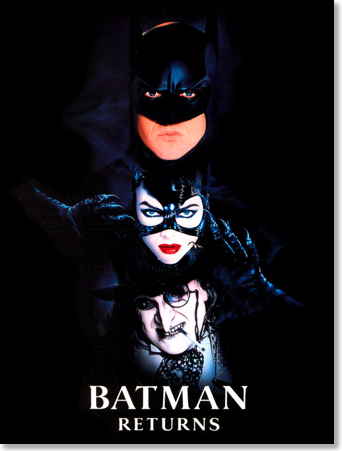
Which leaves Batman Returns. It came out after people had grown accustomed to comic book movies, but before the glut set in and everybody became familiar with the types (origin stories, etc.). The brief synopsis: Batman (Keaton again) must save Gotham City from the diabolical plans of The Penguin (Danny DeVito) and his new partner Max Shreck (Christopher Walken). The wild card is Catwoman (Michelle Pfeiffer) who wants revenge and Batman, but not necessarily in that order.
I believe only about twenty people in America like Batman Returns, which confounds me. Not only is it a good movie in its own right, it’s an important cinematic forefather to all the comic book movies we have now.
With Returns, I think director Tim Burton took his dark cinematic visions about as far as he has ever been able to go--with the exception of his Claymation productions, he hasn’t done anything like Returns since then, not even Mars Attacks!, which is more juvenile than subversive. As much as it is inspired by comic books, Returns is inspired by past films (especially early German and Art Deco films, like Fritz Lang’s Metropolis and Robert Weine’s The Cabinet of Dr. Calagari) and nightmares. Circus people, trains, rubber ducks, cats, penguins and even snow: Burton puts so much menace and dread into childlike and innocent objects in this film, it’s amazing he got away with it.
More amazing still is that everyone working with him seems to get it too, and rises to the challenge. The movie has a totally different look from the first one, but is probably more in line with what Burton imagined originally. It’s probably one of the visually darkest movies ever, as if they shot it with a dust-covered lens. It has some dumb, probably studio required humor--do we need Batman to be a DJ?--but most of the movie heads straight into darkness.
And the actors seem to be letting their inner freaks lose. Keaton seems more comfortable with the role, and adds shades of grey to the character that weren’t there before. Devito overplays his part some, but that’s probably due more to the writing and makeup. Devito can be a good actor when he wants to, and he has some great scenes, especially when he pays respect at the graves of his human family. Pfeiffer, however, is playing Catwoman on a whole other level. She manages to show all the sides of the character, from Catwoman’s before and after transformation to the zeal with which she terrorizes Schrek to her struggle with loving Bruce Wayne/Batman. I’d argue it’s one of the best acted parts for a comic book character ever, and, it’s a standard most actors in comic book movies have been unable to achieve.
As a sort of comic book Rosetta Stone, Batman Returns has even more significance. By the time it came out, people were starting to become familiar with the new “darker” tone that Frank Miller, Alan Moore, and others had established with comic books in the 1980s. Batman started the trend that continues to this day, even as comic book movies have gone from fantastical to more “real-world” settings, like the worlds of Spiderman and the X-men. Returns, in fact, hinges on an interesting point in American cultural history, between a happy we-beat-the-bad guys ending in our fight against Communism and the darker physical, social, political and emotional reality that started with Tianammen Square and has continued ever sense.
This new reality really comes out in the characters. Batman beats the bad guys and saves Gotham, but he isn’t very happy about it, because the personal price is high. The reality of his need to fight evil conflicts with his love of Catwoman. The Penguin and Catwoman are villains of the piece, but are also to some degree sympathetic, which is routine now, but was very new then. We are supposed to be amused at Nicholson’s Joker, but we are never suppose to feel sorry for him the way we are for the Penguin and (especially) Catwoman. Even Schreck can now be seen as a prototype for future comic-book villains, such as the Kingpin. All the characters are multi-sided and complex, given the capacity to do good or evil, usually for some kind of personal gain rather than “because it’s the evil thing to do.” This trend has spread to other types of movies, such as the later James Bond films.
So there is my case: Batman Returns is a good movie and an important one. Go rediscover it. In the meantime, let’s hope they can get an actor who can bring real menace as the Joker, and an editor with a steadier hand, for the inevitable Batman Continues.
Andrew Wells can be reached at arwell012002@yahoo.com.
The Problems with Polls
A Guest Blog by Andrew Wells
No doubt we will be hearing a lot about polls between now and the November elections. I’m already reading about polls concerning the 2008 elections.

How can the opinions of a hundred or a thousand people correctly represent the millions of people in this country, or the billions of people on this planet? It’s just not possible.
But there are other things that bother me about polls. Consider the words of David Mamet, who wrote an essay called "Poll Finds" nearly twenty years ago, when polling wasn’t as ingrained into the culture as it is now:
We know that polls are inaccurate and unjust. We are drawn to them not because of their ability to predict the future, but because of their ability to relieve us of the responsibility of individual thought...the person who answers the poll has no responsibility, they are asked how they feel at any given moment.
I believe that most people are savvy enough today to take any poll with a grain of salt. But we let the polls become self-fulfilling prophecies. For example, we hear enough polls about what voters want to hear, and the next thing you know, candidates are talking about those issues. There is a new book by Joe Klein called Politics Lost that argues that polls and the consultants who interpret them have derailed our entire voting process. Mamet argues that saying a "poll finds" can also mean a "poll rules; i.e., it proclaims what the majority of people are thinking or should be thinking. And because we don’t like "the responsibility of individual thought"--which could lead us to look unpopular against the crowd--even though we don’t believe in the polls, we accept the results as current truth, as what the majority of people think.
But again, consider: "A poll can only discover what the polled believe at that instant to be true. The difference between what many people believe to be true and what may in fact, be true is often and perhaps most times vast."
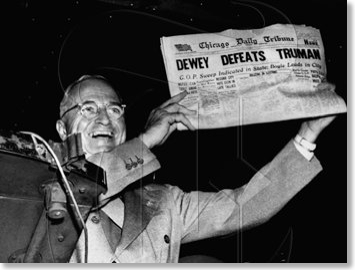
Andrew Wells can be reached at arwell012002@yahoo.com.
One last comment from Rick: I can't help adding to Andrew's post the words of Jesus in Matthew 11:19 (as rendered by Eugene Peterson):
"I came feasting and they called me a lush, a friend of the riff-raff.
Opinion polls don’t count for much, do they?
The proof of the pudding is in the eating."
(Matt 11:19, The Message)
X3 (X-Men: The Last Stand)

GUEST REVIEW BY ANDREW WELLS
We dodged the bullet with this one.
Given the tortured history and bad blood behind this production (which you can read about elsewhere), the rushed schedule to make the release date, and finally having director Brett Ratner, whose middle name might as well be “vanilla,” X-Men: The Last Stand (hereafter referred to simply as X3) should have been a train wreck of gigantic proportions. And judging from Internet discussion, most everyone thought that was what would happen.
But, miracle of miracles, it’s not. It’s within striking distance of being as good as the other two X-men films. And it is very, very satisfying on its own terms.
Without much detail, the movie deals with two major storylines: the discovery of a “cure” for mutants and the return of Jean Grey, who has now become the Phoenix. There are also nods to other storylines and characters, most of which I am not familiar with. But one of the things I have most enjoyed about the X-men movies is their ability to take these characters and storylines and refashion them into a successful mythology of their own. You may have needed to see the other movies, but you needn’t have read the comic books.
Having said all that, here are my other thoughts about the movie:
--One of the things I was most worried about having a new director for X3 was the loss of tone. X-Men and X2 both have a moody, sometimes ambivalent outlook about what is happening to the characters and to their world. The tone really makes the movies work, because these characters are far from perfect, and so is their world. Happily, the tone is still there. Perhaps the best example of it is the scene where Beast and Wolverine look at each other while fighting Magneto and Pyro. They know what they have to do, but they wonder if ethically it’s the right thing to do. They don’t say a word; you can read everything in their eyes.
-- Ethics play a large part with Magneto as well, and thanks to Ian Mckellen’s performance, he remains one of the most interesting characters in the movie: he’s right about what the cure will mean for mutants, but his believed superiority over humans robs him of the humanity he needs. You can see this in his final scene with Mystique, where his response to her is as stone cold as it gets. And his final scene at the chessboard, reflecting on everything he has lost and won, is very moving.

--As to the other actors, most everybody does really well to distinguish themselves, with two exceptions. It doesn’t matter how much fur Beast has; every time you hear him open his mouth, it’s Fraiser Crane, a.k.a. the actor Kelsey Grammer. He’s very good in the role--his fight scenes rock--but the character is just too similar to what he’s played for twenty years. The other exception is Halle Berry, who should never have been in the X-men movies in the first place. For an African weather goddess, her accent bounces around more than a pinball, and she’s never had the majesty that I thought was essential to Storm. I’ve always thought Angela Bassett would have been a better choice, and I still believe it.
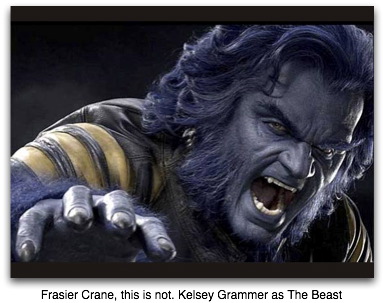
--I was also pleased about the continuity from the previous two movies. They got the minor actors (like Daniel Cudmore who plays Colossus) to come back, and they make good references, like Wolverine asking Rogue if she needs a lift. And I like the chess allusion that Magneto keeps using—touches like that really add to the quality of the movie.
--The production was rushed, but you can only see it in the special effects. Most look great, but there are several scenes where I was just taken out of the movie completely, most notably when Jean leaves the lab and when Wolverine approaches Jean on Alcatraz Island. And why have that great shot of Magneto throwing that rig through the windshield in the movie trailers, but not in the movie?
--And finally, obviously, it’s not the last stand. They’ve made too much money on this not to try again, and the story leaves too many characters' fates in question. Having said that, I think the movie could have benefited from a few more minutes, especially the Rogue/Iceman/Shadowcat storyline. We don’t get to see how that plays out, and it seems unfair. But given how much the movie got right, and how satisfying it was--the best movie experience I’ve had in a good while--it seems trivial to complain about.
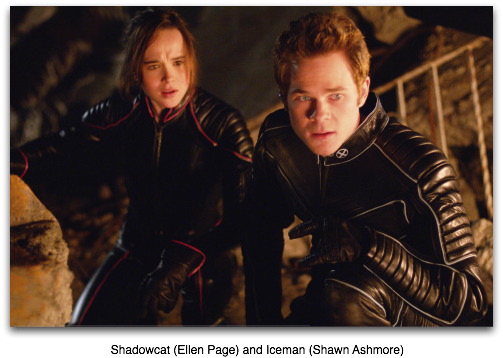
ANDREW WELLS can be contacted at arwell012002@yahoo.com
RICK'S COMMENTS:
There's not much for me to add here, Andrew--great review as always. I don't think I was ever as pessimistic about this movie as some folks were. However, if Brett Ratner's work has proved disappointing to some in the past, he has definitely redeemed himself in this film. In fact, this may very well be my favorite of the trilogy. There was so much action and so many characters, this movie felt like more of the comic books than either of the previous two installments. Who knows--maybe Singer had been holding back on us. I personally liked Grammer as Hank McCoy--more than you did, evidently. Hank McCoy/The Beast is supposed to be an extremely intelligent individual, so I think Grammer's background in "egghead" roles helped with this character, and that was probably why he was cast.
One question, though Andrew-- Angela Bassett as Storm? How old is Storm supposed to be?
Geekish nitpicks--in the comic books, McCoy's blue fur and skin are not part of his mutant characteristics, but rather from his own experimentation on himself. Therefore when he reaches out his hand to the "Leech," his fur should not have disappeared. However, his agility, strength and animal like reflexes are mutations. Incidentally, there was a brief Hank McCoy cameo in X2, where he was played by Steve Bacic, without the blue skin and fur. And although I thought it was really cool to see the Juggernaut in this movie (Vinnie Jones was perfect, accent and all), am I not correct that Juggernaut is not a mutant? I know, I know--it's all simplified for the movies.
Three quick notes:
(1) This movie is incredibly violent. Parents should take note of this before taking small children. Blood is tactfully (and perhaps unrealistically) avoided, but lots of people get killed. I remember at one time, Total Recall held the record for 140 or so deaths. This movie would have to be close to that from what I saw.
(2) If you get up and leave before the credits are over, you will miss the final scene.
(3) This is completely trivial, but in the scene where Wolverine is on his knees in front of a grave (I won't say whose grave), if you look on the left shoulder of his jacket (on the right side of the screen), there's a GIANT spider that has absolutely nothing at all to do with anything in the movie. I'm surprised it wasn't edited out. But just think-- what if it had been a radioactive spider? Then we could have had "Spider-Wolverine-Man."
Whatever Happened to Christian Music?
About twice a year or so, I break out some of my older music albums. I have been listening to music since around 1988, so I’ve been through a lot of music. This time around, I pulled out some old Petra (the Greg X.Voltz era, for those who remember) and, well, it rocked. Rocked hard, both musically and lyrically. “Chamelon”; “More Power to Ya”; “Get on Your Knees and Fight Like a Man.” What great music!
So what is the last Petra song I heard on the radio? “Lord I Lift Your Name on High.” A praise song with a more pop-oriented sound. Catchy, but nothing distinguished. And I have heard this song covered by at least a dozen artists, not to mention in church all the time. A far cry from “Why Should the Father Bother?” Maybe hearing the current Petra is okay for some, but for those with a longer history with the music, they are probably asking the same question I do every time I walk into a the Christian music section: What happened?
Christian music may be selling more and more product, and getting wider recognition, but musically and lyrically, it is in a huge creative slump, I think. I would love to listen to more Christian music, but I find it bland and boring (with some exceptions).
Most of the problem is that Christian music is a business, even if the industry’s goal is to honor Christ and shine a light on Him. And as the music business follows trends, so does Christian music. That is why there are so many praise and worship albums out and a bunch of younger bands doing what Petra is doing—making music that sounds the same as everybody else.
Please understand: there is nothing wrong with praise and worship music. Worship is an important part of the Christian life, and music is helpful in that point. And many of the contemporary praise songs are wonderful. But like anything else, I think it can get monotonous. For example, the only contemporary Christian radio station in my area (Columbia, SC) plays pretty much only praise music. Furthermore, they let listeners determine what they want to hear through Internet voting, so they play pretty much the same few songs by the same artists, and rarely play anything new. If you listened to this station without knowing anything, you’d think Steven Curtis Chapman stopped making music after his Speechless album (from 1999), that Mercy Me and Casting Crowns vanished after their big hits, and that Petra, the Newsboys and Third Day have never done anything but Christian music. Not every station is like this, I know, but it is frustrating.
There are artists past and present who are swimming against the tide, but the nature of the marketplace has driven them to the margins or out altogether. Charlie Peacock is the Paul Simon of Christian music; I know he is still making music, but I cannot find his albums anymore. Iona is a wonderful Irish/Celtic group that does albums around Christian themes; they do not even release albums in America anymore, and have not toured here in years. Sara Groves writes challenging, intimate songs about our relationship with God; I can find her in stores, but not on the radio.
But what really makes me sad is the loss of a lot of good artists. Steve Camp writes provocative songs in the spirit of Keith Green, but his uncompromising views have pushed him out of mainstream Christian music. Steve Taylor music was so eccentric with his music that he left the business entirely. Wayne Watson, Sandi Patty, Julie Miller, Kim Hill, Wes King, Phil Keaggy, Margaret Becker, Mylon Lefevere, Dallas Holm—the list goes on and on. And many record companies have let albums go out of print, so Christian music lovers cannot even check out musical history. Anyone seen a Degarmo and Key album lately? The 77s? Randy Stonehill? Whiteheart? Michael Card? Russ Taff? First Call?
As to the other problem—everyone making music that sounds the same—that is a common problem throughout Christian and secular music, both past and present. The market takes care of itself in some ways, eliminating some and leaving others (Crumbacher, anyone?). Furthermore, I would hope that any Christian musician(s) would be in the business for ministry and honoring God, and nothing else.
Certainly, God has given abundant talent to people who serve in music ministry, both in and out of church. And for many audiences, there is a certain comfort in the familiar. I do not know if there is a solution to the problem I am describing, but I would encourage people to look at Psalms for inspiration. Those poems and songs are about a lot more than praise—they cover every aspect of the Christian experience, and can be extremely challenging, convicting and inspiring. And finally, we must remember that God will put His message in the mouths of those He sends out, just as He did with the prophets and the disciples.
Andrew Wells can be reached at arwell012002@yahoo.com.
Eight Maniacal Thoughts toward Bob the Builder
Things That I Desperately Wish Would Happen While Having to Watch Bob the Builder with my son:

7. That Dizzy the Cement Mixer would start taking A.D.D. medication.
6. That the ATF would bust Farmer Pickles for moonshining, since there is no way he can make money giving away eggs.
5. That Mr. Bentley the building inspector would inform Bob that, due to federal regulations, Bob can’t build it.
4. That the town that Bob and company live in would run out of money and therefore be unable to give Bob so many contracts.
3. That Wendy would whistleblow on Bob about his use of shoddy materials and cheap labor.
2. That Rolly the Steamroller would flatten Spud into a bunch of mashed potatoes.
1. That the DVD would spontaneously combust.
Andrew Wells can be contacted at awusceng@yahoo.com.
In Search of Good Christmas Music
Updated 12/7/2005
So this is Christmas...and the Christmas music is in abundance. It's amazing how many Christmas albums and singles are put out each year. Why, then, can no one seem to name any contemporary Christmas album worth buying?
One reason, I believe, is the roar of the market. It takes a lot of noise to get people's attention, especially in this day and age, and at Christmas, no less. This wasn't a problem even twenty years ago. Two, much of the Christmas music today is overproduced, rushed material hoping to capitalize on a singer's popularity. Three, the best Christmas music always looks to the past and to the standards--it is something in the very nature of the holiday.
With all this in mind, here are some Christmas albums and songs that I’ve discovered over the years that I think are jewels among the coal, along with a few comments:

Elvis Presley, If Everyday Was Like Christmas. There are several different compilations; this one is the best because you can compare Elvis' first Christmas album with his second one; it’s like hearing two different people singing, which is sad if you know about Elvis' life. Added bonus: really great liner notes and some awesome pictures, including Elvis in a snowman costume.
Sparrow Artists, Christmas. This is a 1988 Christmas album from Sparrow Records that highlighted the company's various artists and musical styles. "Various Artists" albums are usually a mixed bag; that’s not the case here. Added bonus: trying to figure out what happened to all the artists on this album--Steven Curtis Chapman is the only person on this album who is still recording, as far as I know. [Rick's update: with the help of the friendly folks at Sparrow records, I actually found this on iTunes.]
Ron Sexsmith, "Maybe this Christmas." Pure bliss. A song that manages in under two minutes to be hopeful, sweet, thoughtful, melancholic, and have a xylophone solo.
Melissa Etheridge, "Happy Christmas (War is Over)." I’m no fan of Melissa Etheridge or John Lennon, but her live version of his song has real power and meaning behind it. [Rick butts in again: I can't find a legal source for this song on the internet either.]
There are more runner-ups than I could list. I would also recommend listening to a radio show called American Routes, which looks at various musical traditions throughout America. They have a couple of Christmas-theme shows a year, and do a wonderful job of finding some obscure and unique musical treasures.
Andrew Wells can be contacted at awusceng@yahoo.com.
If you have your own suggestions, feel free to add them in the comments. If you know of links to purchase any of the music I couldn't find, let me know that as well.
Note: some links on this page require iTunes. If you don't have it, you can download it by clicking the link to the left. But why don't you already have it? It's free.
Mike Newell's Other Movies
I’m one of the only people I know that will go (or not go) see a movie because of who directed it or who wrote it. I’m not just talking about the new Steven Spielberg movie. I mean all movies. It is with that in mind that I’m very curious about Harry Potter and the Goblet of Fire.
Goblet is directed by Mike Newell, who is probably best known for Four Weddings and a Funeral and Donnie Brasco. Newell has also made a couple of films that are real gems, and they are worth seeking out: Enchanted April and Into the West.


Andrew can be contacted at arwell012002@yahoo.com.
A Look Back at the Matrix Trilogy
Return again with me, if you will, to the heady days of 1999, as a sci-fi movie was shaking the world. No, I’m not talking about Star Wars Episode One. I meant The Matrix.
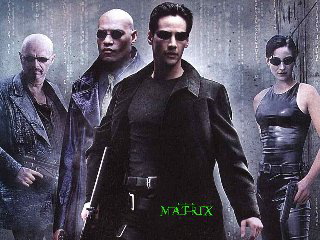
Lots of money was made. Sequels were demanded. And that is where things begin to go askew, and where my autopsy begins.
The Matrix Reloaded and The Matrix Revolutions (abbreviated as Re and Rev from this point on) fall into that rarest of all movie categories: movies that are ambitious, reach for the stars, and fail. I wanted both these movies to succeed, to be great; but when I finally viewed them, no matter how cool the action scenes were, no matter how much great intellectual discussion they threw at me, I knew the movies were flawed, and being the passionate movie person that I am, it tore my heart out. I mean, I’m still thinking about it, and it’s been two years. And judging by Internet chatter, I’m not the only one. The box office speaks too: Re made over $250 million at the theaters; Rev barely made $125 million. Somewhere along the way, people got burned.
What went wrong? I offer up three reasons:
When it gets down to it, they are still movies. The original Matrix successfully appealed to a mainstream audience while maintaining a fan base. Even with all the intellectual discussion, plot and character were never sacrificed. Movie-wise, everything clicked, like the tumblers in a safe. After several viewings, I believe that Re (especially) and Rev (less so) succeed in expanding on the ideas and principles introduced in Matrix. There is a lot to sift through and understand; the material is denser; and, unfortunately, it is not always presented or demonstrated clearly. Nevertheless, it satisfies the fan base.
But the mainstream audience is coming to see a great movie, with a strong plot and good characters. And that is where Re and Rev stumble. There are many problems, so let’s look at a noticeable one: the character of Morpheus.
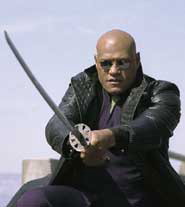
Misjudging what an audience will do. For the sequels, the Wachowski Brothers (the directors) decided to tell their story through several different sources. A series of short cartoons (shown in theaters and online, and then collected on DVD as The Animatrix) were created, with some providing important plot information for the sequels. A video game was also developed, again providing plot information.
For the fan base, that’s more Matrix to enjoy. But for audiences who neither watch cartoons nor play video games it’s a real liability. Without the knowledge learned from other sources, the movies can be hard to follow. For example, who is the (very annoying) kid following Neo around Zion? If you don’t see one of the cartoons, you’ll never know. The movies should have been able to stand on their own.
Finally, the creative control went to the director’s heads. This is pure speculation on my part. Generally, it is the dream of every movie director to have creative control of a project—to not have suggestions made by editors or producers or test audiences. Indeed, I believe movies made by committee are usually the worse for it; but sometimes it is helpful (Casablanca is an outstanding example). Being fairly new in Hollywood at the time, I seriously doubt the Wachowskis had the clout to get creative control for Matrix—too much money (at least $60 million, probably more) was involved. With Re and Rev the Wachowskis had the clout to get complete creative control. With complete control, however, you can wind up in a vacuum, not able to get any feedback or advice from outside your viewpoint. The danger then becomes that when you show your movie to the audience, they might not understand what you were trying to do. I think that is what happened here.
So there you have it—what went wrong and maybe why. No doubt, there will probably be disagreement with my theories. That’s encouraged. As for me, anytime I catch one of the Matrix movies, some part of me will be sad about what could have been.
You can contact Andrew Wells at arwell012002@yahoo.com
Support for Andrew & Leila Wells

I first met Andrew and Leila Wells after a Springdale Church service in 1996. They were both students at the time at the University of Louisville. Kathy and I got to know them better over the years, and we now consider them lifelong friends. In the summer of 2004, Andrew and Leila moved to Columbia, South Carolina so that Leila could pursue a doctorate from the University of South Carolina. Their son, Mason, was born shortly before they left Louisville; he is now 11 months old. They settled into Lexington/Columbia area where Leila started her studies and Andrew found a job. Mason was happy and growing and they were looking for a church in the area.
Then, on March 8, 2005, Andrew was diagnosed with Acute Myelocytic Leukemia, a form of cancer that produces dangerously high white blood cell counts. When diagnosed, Andrew's count was over 200,000--twenty times that of a normal person. He was immediately placed in the hospital where he went through six weeks of induction chemotherapy to achieve a temporary remission, and has had another round since being released from the hospital. Currently he is waiting to have a bone marrow transplant which he hopes to receive sometime this summer at Duke University in Durham, North Carolina.
Andrew's physical health is the primary concern, and he needs our prayer as his doctors work to make him well. However, a second concern right now is the financial stability of the Wells family. Upon learning the further treatment Andrew would undergo, the company he was working for placed him on medical discharge in hopes that he would be eligible for state benefits. Unfortunately, he cannot apply for the particular benefits specified because at the moment there is no way he can actively hold down even part-time employment which would be required. He will not be released by his doctor to return to work until at least October.
Further, because his immune system is weakened from the chemotherapy, the Wells cannot keep Mason in daycare on the chance that he would bring home an illness. Therefore, Leila has had to postpone classes as well as work at the university. Although they have some support from family, they find themselves in grave financial jeopardy as they are not receiving enough income to meet their basic needs, let alone the mounting medical bills. Although they were in the process of looking for a church home, they had not yet found one when Andrew was diagnosed with the cancer.
Throughout the last few weeks, I have talked with Andrew a number of times, and I have often found him to be surprisingly upbeat. He recently wrote me saying, "God has been very good to us throughout this trial. He knew us as we were being formed in our mothers' wombs, and he knows us today--all our needs, hopes and desires. We are trusting Him on a completely new level these days. Now we see more clearly what it means for us to look only to the Lord for our needs. When the systems and strategies of men have been exhausted, God is just beginning to show us his provision and plan for our path to come. As we walk through this trial, we ask that you would pray for us, that God would show His favor."
On Sunday, June 5, Springdale Community Church in Louisville, Kentucky will take up an offering for Andrew. Let me encourage you to be a part of that offering. Please consider sending any amount that you can manage to
Springdale Church
4601 Springdale Road
Louisville, KY 40241
Designate on your check that it's to go to the offering for Andrew Wells. If you can't send a check right now, send it when you can and it will be forwarded to the Wells. If you would like to send something directly to them--financial help, Wal-Mart gift cards, or just a word of encouragement--you can contact them at the address below:
Andrew, Leila, and Mason Wells
226 Corley Woods Drive
Lexington, SC 29072
You can email Andrew at arwell012002@yahoo.com and Leila at leilawells@yahoo.com . As far as I know, little Mason doesn't have an email account yet!
Please be praying for the Wells family. And if you can offer any assistance now or in the days to come, please do so.
Batman Begins: Two Reviews for the Price of One
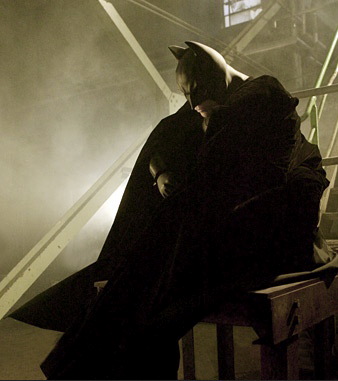
WARNING: There are some spoilers below.
Andrew writes:
The Batman movie is to DC what Spiderman 2 is to Marvel...they not only got it right, they almost got it perfect.
Christian Bale is perfect. He is believable at all levels--Batman, playboy Bruce Wayne, and tortured Bruce Wayne. I thought they made a little too much of playboy Bruce Wayne--I never thought of the Bruce Wayne persona as an alcoholic and playboy, but it makes sense, given that Batman is constructing his persona. Michael Keaton was scary as Batman; Bale is downright menacing everytime he speaks.
Of the rest, Liam Neeson was the best, intense and mean as nails as Bruce's League of Shadows mentor--and also unexpectedly sympathetic. The last shot of him I thought very touching. The Jim Gordon character was good at first, but toward the end he was used as comic relief, and I didn't like that. The character playing Scarecrow was actually scarier without his mask (in a good way). And the Rachel character didn't take too much away from the movie, though you find it hard to believe she is the city D.A. by the end... I mean, she's so young.
Other good things:
• Special effects were happily kept to a fair minimum till the ending.
• The chase involving the Batmobile is impressive.
• The first shot of the League of Shadows mountaintop fortress is beautiful.
• "Can I show you my mask?"
• "Well, at least we'll have extras."
• Bruce Wayne's increasingly hilarious reasons for borrowing weaponry from Lucius Fox.
• "It's kind of technical."
• Bruce's first attempt at jumping buildings, and the way they stage Batman's first appearance.
• "We burned London to the ground."
• Scarecrow's exit.
• The surprising amount of psychology they put into the movie--we really get to see the "birth" of Batman (not just the putting on of the suit), and the implications it has and will have on who Bruce Wayne is, and the cost it will have for him and for his family, his family history (including the way Bruce's parents fit into the villian's plot), and for the city of Gotham.
• The surprise "cameo" at the end.
The bad, if any:
I didn't like the treatment of the Gordon charcter in the latter part of the movie. And I had trouble with the construction of the Bruce Wayne playboy persona. And most of all, as seems to be the standard much today, all the action was shot close up and jarringly edited. Oh, and with about all movies I see these days, they didn't use enough light in the projector and the sound mix was deafening...I actually had trouble hearing some of the dialogue which is unusual for me.
But it was great, great, great. Highly recommended. I'll probably get the DVD, to savor it better.
Rick adds:
In the comic books, Batman returned to his darker roots in the Denny O'Neil/Neil Adams stories of the late sixties and early seventies. This was partly in reaction to the high camp of the television series with Adam West. But then in the eighties, Batman was taken to a rougher, grittier level with the Frank Miller version seen primarily in The Dark Knight Returns and then in Batman: Year One. Frank Miller's Batman was the inspiration behind Tim Burton's 1989 Batman with Michael Keaton, and that version continued in Batman Returns (although I did not care much for the latter--but I know, Andrew, that it is your favorite of last decade's series).
However, I feel that Batman Begins most fully realizes the essence of the Frank Miller Batman. Here Batman is rough, tough and a bit scary to both the bad guys and the good guys. Although scriptwriter David Goyer insists that his inspiration for Batman Begins came from stories other than Miller's Year One, this movie could not have been made without Year One having been written first. If you don't believe me, pick it up and look for the similarities.
At first I was a bit wary of having a whole movie dedicated to Batman's beginnings. The thing I usually don't enjoy in a super-hero movie is the origin story. To me the process of getting there isn't as exciting as what they can do now that they are there. But Batman Begins created a solid back-story to the character. If you've ever wondered how he trained, why he chose the symbol of a bat, where the Batcave came from and the technologies behind the costume and the Batmobile, this movie answers these kinds of questions. Not only does it answer them, it puts them in the context of a compelling story.
And don't think of this as a prequel to the previous four movies. The franchise is completely restarting. When Kathy and I saw it, she kept trying to fit it into what we knew from the other Batman movies. Forget what you learned about Batman in the previous movies. Everything is now new again.
A few nitpicks:
• I know Katie Holmes is the hottest new actress in Hollywood right now, but I felt she was the weakest cast selection. In real life Holmes is 27 years old. She looks 20. I had trouble seeing her as Gotham's district attorney which she promotes to by the end of the movie.
• The plot by Ra's Al Ghul to poison the city is highly convoluted. They poison the city's water supply. Then they are supposed to fire this microwave contraption which will evaporate the water and spread the poison into the air. Well, there are too many steps involved in all that and too much that can go wrong. Why not just fly a crop duster over Gotham and poison everyone that way? See...if I were a criminal mastermind, I would get the job done. I would be practical in my methodology, and I would never EVER explain my whole plan in detail to the one person who might be able to stop me.
• What was the deal with Batman being able to summon a swarm of bats? I've never seen that before. It felt like a parody of Aquaman summoning sea life.
• The movie is hard to hear on two different levels. Most of the movies I see these days are at the theater in Shelbyville, Kentucky, which to me has the best sound system in the area--I think just because it's the newest theater. Well, by the end of Batman Begins my ears were ringing. This movie is just plain LOUD. And there were a number of times that I just couldn't understand the dialogue either because of background noise or because it was just unintelligible.
Other than that, the movie is excellent. Although there were some aspects I liked in the previous four Batman movies, Batman Begins is by far better than any of them. Forget how disappointed you were with Loony Clooney's version of Batman. Make sure you see this movie.
So far, the summer's entertainment is shaping up quite nicely...
The Iron Giant: An Appreciation
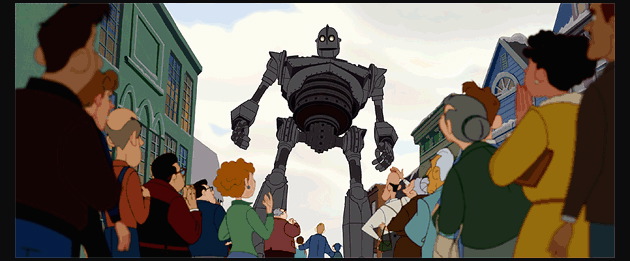
Guest review by Andrew Wells
Several nights ago, my mind somehow wandered around to The Incredibles. If you don’t know--and you probably do--it was a cartoon that came out last year about a family of superheroes who were forced into civilian life. A lot of people--myself included--thought it was the best movie of 2004. I’ve watched it four times, and my general rule is never watch a movie more than once.
So people know about The Incredibles. But they may not know about Brad Bird, the director, or another wonderful cartoon he made.
It's called The Iron Giant. It came out in 1999 and pretty much disappeared from movie screens. I think it has found a good life on video, but I’m not sure.
The story in brief: A lonely boy discovers a giant robot from outer space. The robot has lost its memory, so the boy adopts it and helps him get his memory back. But a government agent knows about the robot, and is trying to track it down...I won’t tell more from there.
I think the reason Iron Giant failed was that it’s not a Disney cartoon, in style or substance. Its look is very moody--the colors are drab, the characters have more angles to them than the rounded Disney characters. Everything feels, well, darker. When was the last time you saw darker in a Disney movie? The Black Cauldron, maybe?

A word of warning for parents: you may want to preview the movie before showing it to your kids, because it has some slightly risqué images--especially a scene involving a squirrel in a guy's pants--and some fairly intense ones involving destruction and the threat of death (which, again, is treated as very real--there is genuine suspense involved). [Rick's note: there's also some mild language that I found totally unnecessary for a movie primarily aimed at children.] Kids may not be completely satisfied with the ending either--it's a happy one, but not a traditional one.
As an adult, however, I find this movie wonderfully satisfying. It’s one of the best films I’ve seen in the last few years, one that made me genuinely feel something, which is pretty rare for me these days. If your heart doesn’t swell when the robot says "Superman" (and you’ll know the moment when you see it), you may not be human.
So go check out The Iron Giant. And then thank Brad Bird, and hope he keeps making great cartoons.
[Rick's note: This movie also has quite a few notables providing voices including Jennifer Anniston, Harry Connick Jr., and Vin Diesel (as the Giant).]
You can contact Andrew Wells at arwell012002@yahoo.com
Links of Interest:
Warner Bros. Iron Giant Site
IMDB Iron Giant Page
IMDB Brad Bird Page
The Iron Man by Ted Hughes











